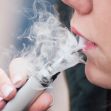Teens usually start smoking by experimenting with fruit, candy, menthol or mint-flavored tobacco. They use e-cigarettes or vaping devices to inhale nicotine concentrations of up to 5%. The Food and Drug Administration (FDA) has seen a “drastic increase” in the use of e-cigarettes by youths in recent years. On June 23, the FDA banned one company, JUUL Labs Inc., from selling its e-cigarettes, vaping devices, and menthol cartridges in the U.S. But just one day later, a federal court granted JUUL’s request for a temporary hold on the sales ban to give the company time to appeal.
The temporary ban, issued by the U.S. Court of Appeals for the D.C. Circuit, gave a “reprieve” to JUUL while the court hears additional arguments. The Court cautioned that the stay “should not be construed in any way as a ruling on the merits.”
FDA Commissioner Robert M. Califf, M.D. explained that JUUL’s marketing denial order (MDO) was issued to ensure that “all e-cigarettes and Electronic Nicotine Delivery Systems (ENDS) meet our public health standards.” A press release from the agency said that JUUL’s application “lacked sufficient evidence regarding the toxicological profiles of the products to demonstrate that marketing would be appropriate for the protection of the public health.”
The agency was concerned with “potentially harmful chemicals leaching from its e-liquid pods.” It said the ban was issued because JUUL had provided conflicting and insufficient data that prevented the FDA from properly assessing its potential health risks.
Califf said that JUUL and similar companies have played a “disproportionate role in the rise of youth vaping.” The ban on JUUL products is “part of a sweeping effort by the agency to attempt to bring scientific scrutiny to the multibillion-dollar vaping industry after years of regulatory delays,” according to an Associated Press news story. The FDA’s recent action is not the first aimed at JUUL. In 2019, the company was ordered to stop producing its fruit and dessert flavored products after it found they were popular with middle and high school students. The following year, the agency limited all flavors except menthol.
Currently, the FDA has authorized 23 ENDS products and other flavored e-cigarettes, such as those produced by R.J. Reynolds, Logic and other companies, while rejecting “a million other products,” according to the New York Times. Nielson reports that the number-one vaping brand in the U.S. was produced by Vuse, which earned $414 million in sales and had a 33.4 percent share of the market. JUUL came in second with 33 percent. No vaping company, however, can compete with traditional cigarettes, which sold about $99 billion last year, compared to only $7.8 billion for all vaping products. Over 30 million smokers remain in the U.S.
ENDS products heat nicotine solutions into vapors that can be inhaled. Companies that produce the e-cigarettes and vaping devices claim that this method “bypasses any toxic chemicals that are produced when tobacco burns.”
In its court filings, JUUL called the FDA’s ban “arbitrary and capricious,” and an “extraordinary and unlawful action.” It also claimed that the FDA’s ban only came after “immense political pressure from Congress once it became politically convenient to blame (JUUL) for youth vaping even though several of its competitors now have a larger market share and much higher underage-use rates.”
The President of the American Lung Association, Harold Wimmer, disagreed when he told The Hill, “Juul (sic) was the most popular e-cigarette among teens for several years and remains the most popular today.” He praised the FDA and said that its action “sends the message to companies that their blatant disregard for public health will not be tolerated.”
The FDA is currently conducting a broad review of e-cigarettes as it attempts to balance blocking sales to prevent teens from “getting hooked” while allowing sales that might help adults switch from traditional cigarettes as they try to quit. This is one test to determine what protects public health.
The Court gave JUUL until June 26 to file additional motions, and the FDA has until July 7 to respond. Meanwhile, cartridges, tobacco and menthol pods remain available. The FDA cautioned sellers to be careful because enforcement actions would occur once the stay is lifted.






